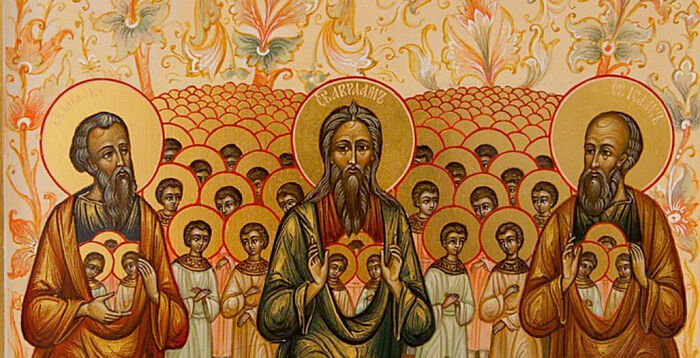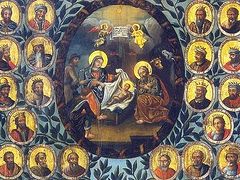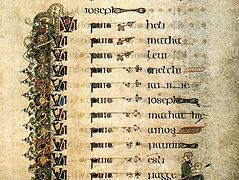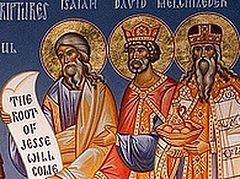The following homily was given on January 2, 1994.
In the name of the Father, and of the Son, and of the holy Spirit!
“Let us celebrate, O people, the prefeast of Christ’s Nativity! Let us raise our minds on high, let us ascend to Bethlehem in spirit”—on the last Sunday before the Nativity of Christ, we hear, dear friends, this call of the holy Church to deep reflection upon the essence of the coming great feast.
The event that took place twenty centuries ago was so great that it has no equal in all of history. Great is the mystery of godliness: God was manifest in the flesh (1 Tim. 3:16).
Little, unknown Bethlehem, and in it, a squalid cave, a poor animal manger became the center of attention for the whole world and the starting point of the new time, for in it lay the uncontainable Christ God.
God—the King of the world—appeared as a humble infant, in Whom few saw God’s greatness, and glory, and power at the moment of His birth. The world had been waiting for this infant from the beginning of its history, having received God’s promise of the appearance of the Savior and Redeemer of mankind on earth in prophecies: And thou Bethlehem, in the land of Juda, art not the least among the princes of Juda: for out of thee shall come a Governor, that shall rule my people Israel (Mt. 2:6). With the birth of Christ came the end of all prophecies about Him, and that which was hidden and obscure in the Old Testament was illuminated by the appearance of the Divine Infant and became manifest.
Many babies were born in Bethlehem, both noble and distinguished, but in none of them did the world suspect the One by Whom it was to be saved and in anticipation of Whom it languished.
Everything in the world changed only with the birth of Jesus Christ, for the time of the law ended with Him, and grace imperiously transformed all living things and wiped away the tears of hopelessness. I’ll give a rather remote analogy: All of us unmistakably recognize the effects of God’s grace on our souls, on our hearts. Everything changes within us—faces brighten, eyes shine with joy and light, and blessed silence gives rest to the heart. And it isn’t just within us that this happens. The grace that touches us also transforms everything around us—nature, contrary to its laws, responds to what happens with us.
The world felt this, and incomparably more clearly, with the birth of the God-child Christ. And it could not have been otherwise, my dears, for the Eternal appeared in time, and the Incorporeal in the flesh, and with Him eternity entered into the world. All living things were illuminated with the uncreated light of God and eternity. And the Church sings: “Thou wast born secretly in the cave, but Heaven spake through a star and proclaimed Thee to all…”
Christ was born—God and Man, and by His birth began His path of the Cross—His work for the salvation of the world and the creation of a new man—a child of God.
The Bethlehem cave, making room for the humble greatness of the Son of God and Son of Man, became a prototype of the holy Orthodox Church, where the Divine infant Christ lies daily on the table of oblation as in a manger in the serving of the Liturgy, at proskomedia, enclosing within Himself a whole life from birth to the great Golgotha sacrifice— Behold the Lamb of God, Which taketh away the sin of the world (Jn. 1:29).
Every year and every day the world experiences the Mystery of the life of Christ on earth. Every day Christ is born, and serves, and dies, and rises again, raising the world with Himself. And before the face of eternity, all the “days of the flesh” of the Lord Jesus Christ make up one moment in which the Incarnation, His death on the Cross, and the Resurrection are connected together.
With God, one day is as a thousand years, and a thousand years as one day, and this is eternity, invading earthly time. Our lives are also an example of this, for they also flow into eternity, erasing time. Look back on your life. Having just begun, it was already rapidly moving towards its end, and the boundless ocean of eternity is ready to engulf us.
The human heart, in the moment of its life, must also become like the Bethlehem cave, where Christ—God and Man—is born, grows, lives, and reigns. And as our heart opens to Christ the Savior, it is sanctified by His Divine light and becomes strong by His Divine strength. And the “beasts”—our human passions living in it—flee from it into the outer darkness, and we are able to bring God the pure-hearted gift of our love, reigning with Christ and God by it.
On the eve of the Nativity of Christ, when earthly time was torn asunder, like the Temple veil, and the world was divided into the times “before” and “after” the Nativity of Christ, the holy Church recalls the blessed memory of those who lived by faith, anticipation, and who by their lives, their flesh became akin to the God-Man Christ Who has appeared in the world. After all, Christ is God Who has joined humanity, not a man newly created by God, but His humanity enters into the history of mankind, which lived before the Nativity of Christ on earth.
Humanity created in its wombs, its bowels, she who became the Mother of God, more honorable than the cherubim and more glorious beyond compare than the seraphim.
And now the prayerful memory of those who served to prepare the human nature of Christ is lifted up in the Church: The book of the generation of Jesus Christ, the son of David, the son of Abraham. Abraham begat Isaac; and Isaac begat Jacob…--we hear these words of the holy Gospel today (Mt. 1:1-2). Then there is a long list of names, and behind every name is a specific person who participated in the birth of Christ the Savior by his life. The flesh and humanity of Christ were woven from millennium to millennium.
And it is impossible, our friends, not to note one thought that is pleasing for us.
In this ladder of human names, not only those who have achieved holiness with their lives are preserved for us, but also those who walked through sin, who made their way through human weakness, and out of the darkness sought light, truth, and holiness. And these people did not always realize their searching and dreams in life, but lived by faith, walked towards God, and wanted to live by God.
Christ was united with the human race, choosing from it not only the righteous and not only the saints. Himself being tempted by sin, He knew the measure of human infirmity and weakness, and being like men in all things except sin, incarnated all within Himself by His Divine love and redeemed all by Himself.
By His human holiness, Christ justified all, both those who were His flesh and blood and those who were born of Him in spirit. And old Israel, which lived before the Nativity of Christ, and we, the New Israel, which appeared in the world together with the Nativity of Christ under the canopy of God’s grace, are united in the same feelings, which are in Christ Jesus, the most important of which are faith, hope, and love. It is precisely these feelings that make us family and friends, despite the space and time that divide people. These feelings can be called, in other words, the thirst for God.
The Old Testament holy fathers, who sat in the region and shadow of death, lived and worked wonders by faith in the fulfillment of what they awaited: … subdued kingdoms, wrought righteousness … stopped the mouths of lions, quenched the violence of fire… They were stoned… Those of whom the world was not worthy: they wandered in deserts, and in mountains, and in dens and caves of the earth (Heb. 11:33-34, 37, 38). Only faith in God’s promise gave birth to hope, and hope was nourished by faith and patient waiting.
I won’t recall the podvigs of faith of the holy fathers of the Old Testament. I’ll just remind you, my dears, that they did not tire of waiting and lived patiently and hopefully not for a day, not for a year, not for 100 years, but 5,508 years.1 How many generations disappeared into eternity over these millennia.
But this waiting was their inner urge, for God was with them. And these all died in faith, not having received the promises, but having seen them afar off, and were persuaded of them, and embraced them, and confessed that they were strangers and pilgrims on the earth (Heb. 11:13). Bearing witness to the truth of their faith with their lives, they sought and strove after the best, that is, the Heavenly Fatherland, of which God is the Artist and Builder.
And now the time is fulfilled—Christ God is born, and He begins a new series of saints of God, and we, sinners, are in this series, by the grace of the Lord.
The holy apostle Paul calls Jesus Christ the New Adam from Whom came a new holy posterity, adorned with His name and destined for eternal salvation. This great posterity consists of all Christians who have embraced His teaching, who are born of water and Spirit in His name and feed upon His Divine Body and Blood in the Mystery of Holy Communion, nourished and living in the womb of His Church.
Our kinship with Christ is not carnal, but spiritual, and it requires constant affinity in thoughts, feelings, desires, and aspirations. And having, in comparison with Old Testament humanity, the highest advantages—filial closeness in relation to God, Divine gifts of grace that strengthen, illuminate, and enlighten the whole of man, and undoubting faith in the future life—we still must be attentive to ourselves, to be one in spirit with Christ not only by birth, but also by life. For we also carry the weakness of fallen human nature within ourselves, as did our Old Testament ancestors. But we no longer look around with a cry for help; we know that God is with us! We have the living examples of many, many saints of God, calling us to follow them on the path of salvation.
And it is impossible to remain silent today about two of them whose memory falls on this day.
One is a holy bishop who learned “at the feet” of the disciple of Christ, the holy apostle and Evangelist John the Theologian. This is St. Ignatius the God-Bearer, who lived in the first century of Christianity. The other is the holy and righteous Fr. John of Kronstadt, the wonderworker, glorified in the twentieth century, just three years ago.2 Both of them showed their love of God so completely that they dissolved into it.3
St. Ignatius the God-Bearer was a child during the life of Christ the Savior, and Tradition says that it was he whom the Lord Jesus Christ embraced during His conversation with the disciples, when He said: Except ye be converted, and become as little children, ye shall not enter into the Kingdom of Heaven (Mt. 18:3). God’s grace rested on the child Ignatius and led him on the path of salvation, entrusting him first to the teaching of St. John the Theologian, and then bestowing him with the bishop’s staff, to manage the word of truth in the newly-emerging people of God. And it, the grace of God, crowned him with a martyr’s crown for the name of Christ.
The name of God-Bearer, which he received because the Lord Jesus Christ held him in His arms as a child, was affirmed for him and for his zealous love for God, as he thirsted for God with his whole life.
Under the pagan Emperor Trajan, the holy bishop was brought to trial for preaching the name of Christ and was condemned to a terrible execution—to be eaten by wild animals.
While traveling from Antioch to Rome, to the place of his execution, St. Ignatius wrote seven epistles to his flock that reveal his soul engulfed in flames of love for Christ: “Now I write, full of life, filled with the desire of love to die for Christ… I am the wheat of God, and let me be ground by the teeth of the wild beasts, that I may be found the pure bread of Christ… Now I begin to be a disciple, now that I desire nothing either visible or invisible, but that I should attain to Christ” (Epistle to the Romans).
Hearing him constantly repeating the name of Jesus Christ, those leading him to execution asked him about it, and St. Ignatius replied that the name of Jesus was written on his heart, and therefore his lips constantly confessed Him Whom he constantly bore in his heart. God granted St. Ignatius to fearlessly face his terrible death. And on the heart of the holy martyr, which remained intact, they saw imprinted the initial letters of the name of his beloved Jesus Christ.
The courageous death of the martyr and the strength of his prayer stopped the persecution of Christians for a time, as the Emperor Trajan issued a special decree to stop all persecution of Christians.
And we, weak in sin, do not ourselves have boldness and strength, but with the help of the saints, we walk the path to Christ.
Then there is the great living pillar of our times, connecting Heaven and earth—the righteous St. John of Kronstadt—a vivid testimony to the truth of Orthodox Christianity. A wondrous man of prayer before the throne of God during his lifetime, he received the crown of holiness long before his glorification by man for the splendor of God’s grace that he radiated, for those innumerable miracles that he manifested and still manifests to this day.
The righteous St. John of Kronstadt teaches us by the example of his life how to live eternal truths in our times, achieving spiritual perfection by his spirit aflame for the Mediator of the New Covenant, Jesus.
He did not visibly perform any podvigs; he simply lived like all people, but he lived in God and did everything for His sake and in His name. The main work of the life of the good shepherd St. John of Kronstadt was his fervent celebration of the Liturgy and his equally fervent prayer. His entire life and all his activities were entirely nourished and inspired by his priestly service at the holy altar table. His prayer was crowned with numerous miraculous healings, and he did not hide these miracles, but pointed to the Holy Sacraments as the source of his prayerful power.
St. John showed us a perfect life; he offered his life in sacrifice to God and man. And the omnipotence of God’s love manifested itself through him, turning him into a living sacrifice favorable to God. Having entered into his heart from infancy, Christ brought him up to the full measure of His age, and he now stands for us and for Russia before the face of God in the Kingdom of Heaven. And he calls us from there: “Russia, be what Christ needs you to be!”
“Come, all of you, our friends, let us truly celebrate the Nativity of Christ today.” Let us follow the example of the New Testament saints and the Old Testament righteous ones in their strong desire to meet, see, and accept Jesus Christ, Who is born, and like them, to bring Him our love and humility, so that the poor mangers of our hearts might become the favorite manger of the Christ Child on earth.
And don’t forget, children of God—evil is powerless, we are eternal, and God with us! Amen.




